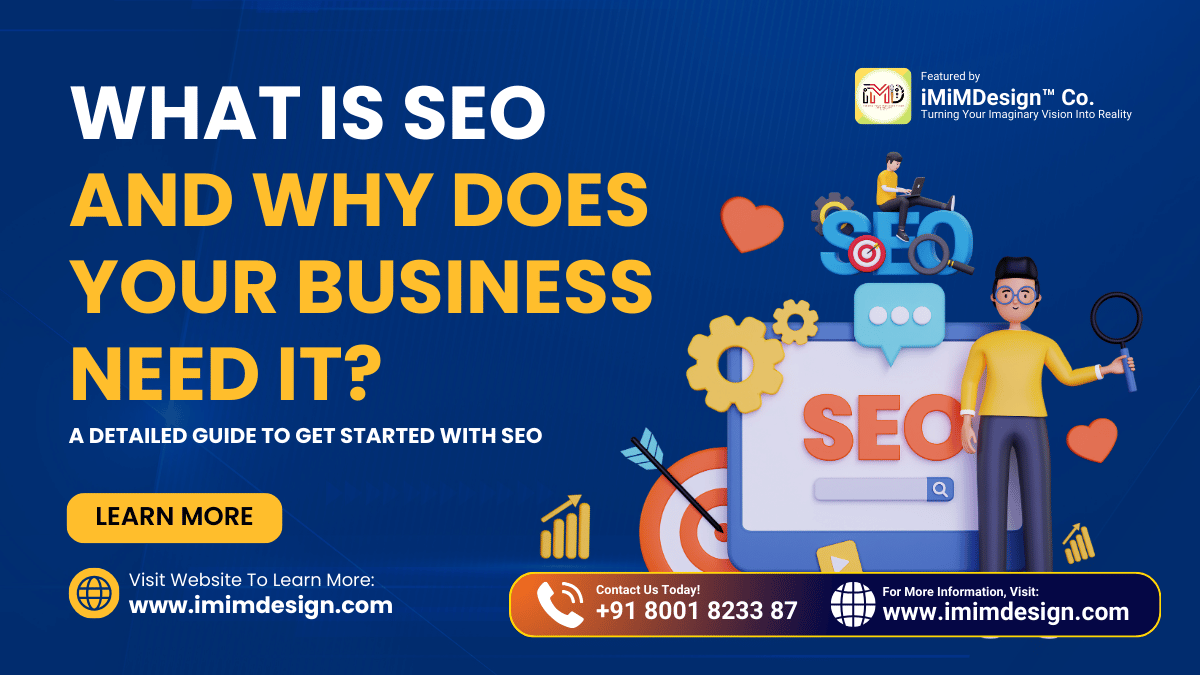SEO means Search Engine Optimization, which is the practice of improving a website’s visibility in search engine results. By optimizing various elements such as content, keywords, and technical aspects, businesses can enhance their chances of ranking higher on search engine results pages (SERPs).
In today’s digital age, where nearly every business operates online, SEO has become an essential tool for success. As consumers increasingly rely on search engines to discover products and services, having a strong SEO strategy is crucial for standing out and attracting the right audience.
This blog will explore what search engine optimization means, how it works, and why it’s a must-have for businesses aiming to thrive in an increasingly competitive online environment.
What Is SEO?
SEO stands for Search Engine Optimization. It’s the process of optimizing a website so it ranks higher on search engine results pages (SERPs). The higher your website ranks, the more visible it becomes to potential visitors. This visibility is crucial because most users tend to click only on the top results when searching for information, products, or services online.
How It Works
- Use of Keywords: One of the fundamental aspects of SEO is the use of keywords. These are words and phrases that users type into search engines when looking for something. By incorporating relevant keywords into your website’s content, you increase your chances of appearing in search results when users search for those terms.
- Creating Relevant, High-Quality Content: Content is king in the world of SEO. Search engines prioritize websites that offer valuable, informative, and engaging content. By providing useful information, answering questions, and addressing the needs of your target audience, you can improve your website’s ranking and keep users engaged.
- Technical Optimizations: SEO also involves technical improvements to your website. These include ensuring mobile-friendliness, improving site speed, and optimizing structured data. Mobile-friendliness is critical as more users browse from mobile devices. A fast website not only offers a better user experience but also ranks better. Structured data helps search engines understand your content better, leading to more accurate and relevant results in SERPs.
Types of SEO
- On-Page SEO: This involves optimizing elements on your website itself, such as content, keywords, and meta tags. On-page SEO is essential because it helps search engines understand what your page is about. Relevant keywords should be strategically placed in headings, titles, and within the body content. Meta tags, like meta descriptions and alt text for images, provide additional context and improve your site’s searchability.
- Off-Page SEO: Off-page SEO focuses on factors that occur outside of your website but still impact your rankings. One of the most important aspects of off-page SEO is backlinks. These are links from other websites that point to your site. The more high-quality backlinks you have, the more authority and credibility your website gains in the eyes of search engines. Social signals, such as shares and mentions on social media, also play a role in off-page SEO.
- Technical SEO: Technical SEO refers to the backend elements of your website that affect its performance in search engines. This includes improving site architecture (the structure and organization of your website), ensuring crawlability (allowing search engine bots to index your pages), and enhancing page load speed. A well-optimized website architecture helps search engines and users navigate your site more easily, leading to better rankings.
By focusing on these core components, businesses can effectively optimize their websites for search engines and significantly improve their online visibility.
The Importance of SEO for Businesses
In today’s digital world, SEO is no longer a luxury—it’s a necessity for businesses looking to thrive online. Here’s why SEO is so crucial for your business:
Increased Visibility
The primary benefit of SEO is increased visibility. When your website is optimized, search engines rank it higher in search results, making it more visible to potential customers. Higher rankings mean your site appears more frequently when users search for keywords related to your business, driving more traffic to your site. This is vital because studies show that users rarely scroll past the first page of search results. SEO helps ensure that your website stays at the top, making it easier for customers to find you.
Builds Credibility and Trust
A high-ranking website is often viewed as more credible by users. Search engines like Google prioritize websites that offer relevant, authoritative content, and seamless user experiences. When your site ranks high in search results, customers are more likely to trust your business. Trust plays a significant role in consumer decisions, and SEO is a powerful way to build that trust with both search engines and your target audience.
Drives Quality Traffic
SEO targets users who are actively searching for your products or services. Unlike traditional forms of marketing, SEO ensures that you reach people who are already interested in what you offer. By optimizing your website with relevant keywords, you are attracting a steady stream of potential customers who are more likely to convert. For example, a well-optimized site with the right blogging SEO practices can help your content rank higher, driving more qualified traffic.
Cost-Effectiveness
One of the most compelling reasons to invest in SEO is its cost-effectiveness. Unlike paid advertising, where costs can quickly add up, organic traffic driven by SEO is free. While it takes time and effort to implement a successful SEO strategy, the long-term benefits are well worth it. Organic traffic provides sustainable growth without the need for continuous spending on ads. With tools like SEO audit for free and top 5 free SEO tools, businesses can assess their performance and improve without breaking the bank.
Competitive Advantage
SEO gives your business a competitive edge. Many businesses still overlook the importance of SEO, focusing only on paid advertising or social media. By prioritizing SEO, you can stay ahead of competitors who aren’t optimizing their websites. Whether it’s through local SEO or broader strategies, ranking higher than your competitors on search engine results can significantly impact your market share.
Real-World Examples of SEO Benefits
SEO has proven to be a game-changer for many businesses, driving more traffic and increasing sales. For example, consider a small e-commerce business that specializes in handmade jewelry. Before implementing SEO strategies, the website was buried deep on search engine results pages (SERPs), receiving minimal traffic. After optimizing their website with targeted keywords like “handmade jewelry” and “unique jewelry gifts,” they saw a significant increase in traffic. Within six months, their website’s organic traffic grew by 120%, and they noticed a 30% increase in sales—directly attributed to SEO.
Statistics also back up the power of SEO. Did you know that 75% of users never scroll past the first page of search results?
This means that if your website doesn’t appear on that first page, you’re missing out on a massive pool of potential customers. By ranking higher through effective SEO, you position your business in front of users who are actively searching for what you offer. As a result, businesses that invest in SEO see not only increased visibility but also a direct impact on sales and revenue.
Common Misconceptions About SEO
SEO is often misunderstood, and there are several misconceptions that can lead businesses astray. Here are some of the most common myths:
- “SEO is a one-time effort.” Many businesses believe that once their website is optimized for search engines, they can forget about SEO. However, SEO is not a one-and-done task; it requires continuous effort. Search engines constantly update their algorithms, and your competitors are also working on improving their SEO strategies. Regular SEO audits, keyword updates, and content optimization are essential to maintain or improve your rankings. This ongoing work ensures that your website remains visible and relevant in an ever-changing digital landscape.
- “SEO guarantees instant results.” Another common myth is that SEO provides immediate results. In reality, SEO is a long-term strategy. It can take weeks or even months to see significant improvements in your website’s rankings and traffic. Unlike paid ads, which deliver instant visibility, SEO focuses on building organic growth over time. Patience and consistency are key to reaping the rewards of SEO, as it gradually builds credibility and authority for your website.
- “Only big businesses benefit from SEO.” It’s easy to assume that SEO is only for large companies with big budgets, but this couldn’t be further from the truth. In fact, SEO can be incredibly beneficial for small businesses, especially when leveraging local SEO. By optimizing for location-based keywords, small businesses can attract nearby customers actively searching for their products or services. With tools like Google My Business, small businesses can improve their visibility without competing against massive corporations on a global scale. SEO levels the playing field, giving small businesses the opportunity to thrive online.
Why Your Business Needs SEO Today
Adapting to Consumer Behavior:
In today’s digital age, most consumers begin their shopping or research process online. Whether it’s searching for a product, service, or solution to a problem, search engines are often the first stop. In fact, studies show that over 90% of online experiences start with a search engine. As more people turn to Google and other search engines, businesses that don’t have strong SEO strategies risk being overlooked. By optimizing your website for search engines, you increase your chances of reaching potential customers exactly when they are looking for what you offer.
Expanding Reach:
One of the biggest advantages of SEO is the ability to reach a broader audience. Whether your goal is to attract local customers or expand your business globally, SEO provides the tools to make this possible. Through localized SEO strategies, such as optimizing for “near me” searches and setting up Google My Business, you can connect with local customers. Meanwhile, global SEO can help your business gain visibility on an international scale. Regardless of your target market, SEO ensures that your business gets discovered by the right people at the right time.
Measurable Results:
Unlike traditional advertising, SEO allows businesses to track detailed metrics about website performance, user behavior, and overall ROI. With tools like Google Analytics, businesses can monitor how visitors are finding their website, what keywords they’re using, and which pages are attracting the most traffic. These insights can then be used to refine your SEO strategy, making it even more effective. Unlike paid ads, SEO results are organic, meaning they are based on the value you provide, leading to long-term growth. With SEO, you get measurable results that show the true impact of your online efforts.
How to Get Started with SEO
If you’re ready to improve your website’s SEO but aren’t sure where to begin, you can start by following these DIY steps:
DIY Steps:
- Perform Keyword Research
The foundation of SEO is knowing the keywords that your target audience is searching for. Use tools like Google Keyword Planner or small SEO tools to identify relevant keywords for your industry. These keywords should be strategically placed throughout your content, meta descriptions, and titles to increase your visibility in search engine results. When performing keyword research, focus on both short-tail and long-tail keywords to cover a range of search intent. - Optimize Your Website’s Meta Tags and Content
Meta tags, such as title tags and meta descriptions, play a crucial role in how your pages are indexed and displayed in search results. Ensure that each page has unique and optimized meta tags with targeted keywords. In addition, focus on creating high-quality, relevant content that resonates with your audience. Use your keywords naturally within the text, and make sure the content is valuable, informative, and user-friendly. - Set Up Google My Business for Local SEO
If you’re a local business, Google My Business (GMB) is a must. It’s a free tool that helps your business appear on Google Search and Google Maps when users search for services or products in your area. By creating or claiming your GMB profile, you’ll increase your chances of appearing in local search results, driving more foot traffic to your business and boosting your online visibility.
When to Hire Professionals for SEO
While it’s entirely possible to start SEO on your own, there are times when hiring a professional is the right choice:
- Lack of Time or Expertise
SEO can be time-consuming and requires a specific skill set to do effectively. If you don’t have the time to learn the ins and outs of SEO, or if you feel overwhelmed by the process, it might be worth hiring an SEO professional who can implement the strategy for you. - Need for a More Comprehensive SEO Strategy
If your website is large or your business requires a more advanced SEO strategy (e.g., eCommerce SEO, technical SEO), a professional SEO agency can create a tailored plan that aligns with your business goals. They’ll be able to analyze your current website, identify issues, and develop a strategy that can lead to long-term growth and better ROI.
Looking for professionals? Check out our SEO Services.

Whether you decide to do it yourself or hire a professional, the most important thing is to start working on SEO today. By taking the necessary steps, you’ll improve your website’s visibility, drive more traffic, and increase conversions.
Conclusion
In conclusion, SEO (Search Engine Optimization) is an indispensable tool for any business looking to succeed in today’s digital landscape. By optimizing your website with targeted keywords, high-quality content, and technical improvements, you can enhance your visibility on search engines, attract more organic traffic, and ultimately drive business growth. Whether you’re a small business or a large enterprise, SEO is crucial for establishing credibility, staying ahead of competitors, and improving your bottom line.
Remember, SEO is not a one-time effort—it requires ongoing work and adaptation to ever-evolving search engine algorithms. By using top free SEO tools, such as those for SEO audits and keyword research, businesses can continuously refine their strategies and measure success. Investing in SEO today ensures that your business can be found by the right people, expand its reach, and deliver a more valuable user experience.
So, if you haven’t already, now is the time to start implementing SEO practices. Whether you choose to handle it in-house or hire SEO professionals, the benefits will be well worth the effort. Don’t let your business fall behind—optimize your website and watch it thrive in the competitive online marketplace.






